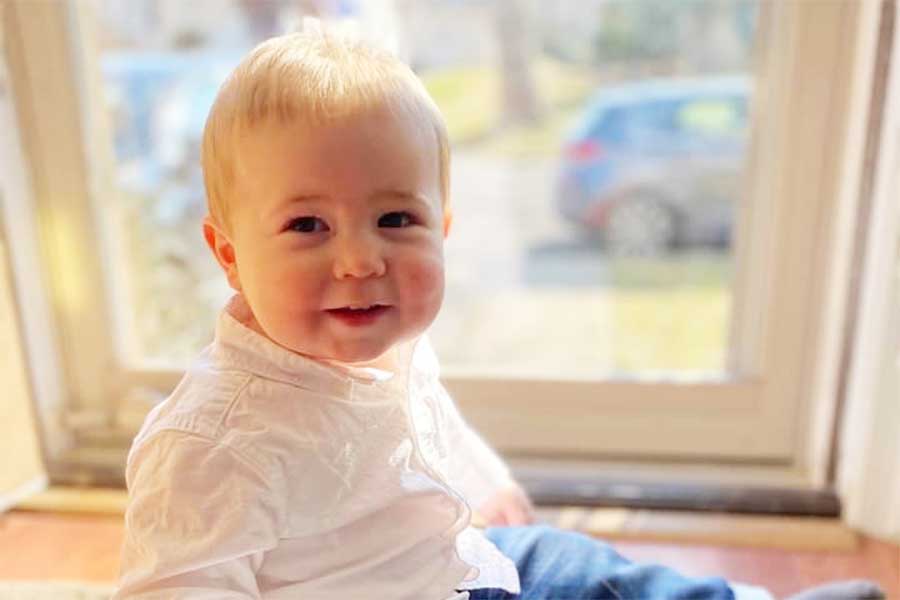“We’re making our way into Savasana, our final resting pose.”
Craaaaash.
“Take up lots of space, allow the eyes to close. Take these few moments of stillness and silence.”
Why are you being so difficult?!
“I encourage you to stay in Savasana for as long as you’d like. When you are ready to get up, do so slowly. There is no rush.”
Thaaaaat!
Ugh. “Screw Savasana,” I thought angrily, flying up off my bedroom floor to see what havoc Jackson was unleashing on Ashlee in the living room. As I jogged down the steps, I left behind the momentary relaxation I had started to glean from my first crack at a YouTube-led yoga session to help her put out the fires he was causing.

While we have had a year-and-a-half to learn how to manage the physical and mental toll of parenting, as Jackson gets older, I’ve recently noticed emotional exhaustion creeping up — and that it was leaving me feeling perpetually short-tempered, scattered and like I had little emotional availability for any other aspect of my life. As any caretaker will likely agree, being responsible for another being — regardless of their age or role in your life — can be an extremely fulfilling experience, but the emotional labor you have to invest can also be draining on the spirit. Here’s why:

Putting on a happy face
I work for an HR magazine and, in this capacity, have come across numerous studies detailing the deleterious effect of faking happiness in the workplace: Workers who have to plaster smiles for customers or managers and suppress true emotions experience lower levels of job satisfaction, performance and productivity. We all have bad days or bad moments in our days, and it’s natural to work through that reality, but there’s an expectation that parents — who are supposed to be modeling healthy emotional displays for their kids — project a constant even-keeled calm, meaning they have to consistently reject their emotional inclinations.
We all likely experience countless moments of annoyance throughout the day — a dropped phone, a stubbed toe, a forgotten task; usually, once we express ourselves (and maybe a few curses), that irritation will dissipate. With a little one watching your every move and word, however, that natural process is stymied.
Jackson is going through a phase where he hates car rides — even the quick 12-minute ride home from daycare usually includes red-faced screaming (after he gets bored with his new trick of taking off his socks and shoes and throwing them to places unknown). After eight hours of work filled with meetings, frustrations and unanswered emails, the last thing my stress-addled emotional state wants to hear as I hit every red light is blood-curdling screaming from the back seat. While I may want to scream right along with him, instead I blast his toddler tunes, adding my sing-songy voice to the mix and updating him happily with “Just one more mile!”, “You’re doing so great!”, “We’ll be home soon!”. No, he’s not doing great, but honesty wouldn’t get me any closer to that elusive peace and quiet.
Tonight gave me prime material for this column, as I was tripped up by annoying mishap after mishap as Jackson sat in his highchair awaiting dinner: His plate started sparking in the microwave; I lost his water cup; I found his water cup and then spilled the entire thing on the floor; I realized I was out of paper towels; I knocked a just-bought carton of blueberries onto the floor, squashing more than I could count as I tried to clean them up with toilet paper. As a topper, my counter-surfer of a dog (after wrestling me for the dropped blueberries) deftly swiped the sandwich I was trying to slap together for my lunch tomorrow into her mouth and went running. After a particularly challenging day, every fiber of me wanted to take that annoyance out with a battle to the death to pry the food from her jaws — but I instead gave in and let her win. I angry whispered some choice words into her furry ear and unceremoniously shoved her out the back door — and turned around with a smile for Jackson to tell him how well he was eating his dinner.
Riding the wave of toddler emotions
If I was asked to assign one word to Jackson’s 18-month-old self, it would be unpredictable. One minute, he’s a singing, dancing laugh riot, and the next — perhaps if the dog brushes past him, you try to take something out of his hand or the wind blows — he transforms into an angry, screaming gremlin. I love him more than words can say, but he is a temperamental, emotional mess.
And that’s par for the course as he navigates this entirely new world with limited ability to understand his surroundings or communicate his feelings. Remembering that makes his bewildering mood swings a bit easier to tolerate, but that’s not to say they don’t take their toll on our own emotions.
Jackson recently went through a hellish two weeks of disrupted sleep — it may have been a tooth or it could have been what we’ve learned is referred to as the 18-month sleep regression. Whatever caused it, his usual 12 hours of unbroken sleep turned into two hours up, followed by two hours down and so on — and we had to smile our way through it to try to calm him. One night, I leaned over his crib and whisper-sang “Twinkle, Twinkle, Little Star” for a solid 20 minutes at 4 a.m.; as his breathing gradually deepened and my back nearly gave out, I slowly moved my hand off his back and started creeping backward. The second I stepped into the hallway, I was greeted with an angry yell. Back I went with my sing-songy sweet voice to soothe him back down and tell him everything was OK, even though I was ready to jump out of his bedroom window.
On another sleepless night, after hours of the back and forth, I finally knew I had hit my emotional limit and couldn’t fake it until he made it anymore; I turned off the baby monitor, went down into the living room, put in earplugs and pulled a blanket over my head. Then, I tossed and turned for another few hours, turning the monitor off and on every 10 minutes to make sure he was OK.
That’s another dimension of the emotional upheaval of raising a toddler: Parents absorb each one of their kids’ wild emotions, especially since they’re so often connected to our actions. His sadness the night I turned off the monitor wracked me with guilt because I knew if I could just keep my hand on his back the whole night he’d be soothed (though unrealistic). When Jackson’s scared, I know that a hug and a quick rendition of “Wheels on the Bus” will both calm and comfort him. And when he’s happy, I know that my walking out of the room or not giving him my undivided attention could knock that adorable smile off course, so I feel rooted to the spot to keep his constantly wavering emotions in check.
I often think about that dynamic in terms of, what if Jackson was an adult? What if you knew a co-worker would collapse into a kicking and screaming fit on the floor of the office if you asked them to stop stealing all of your lunch? What if you had to brace yourself for a friend to angrily throw your phone at the wall if you tried to stop her from taking 6,000 selfies? What if you knew a family member would turn on a dime from laughing to screaming if you stopped handing him snacks? Humorous to picture, but also exhausting!
Such musings also make me consider how grateful I am to be in an LGBTQ relationship. While certainly not true across the board, I have a feeling many women in heterosexual relationships bear the brunt of managing this emotional roller coaster. As same-sex partners, we don’t have to grapple with such stereotypical expectations for how we care for Jackson, which makes sharing that emotional labor a bit easier.
All caretakers have to invest emotional labor, but just as important is finding outlets through which to naturally express our own emotions — because when our emotional health is suffering, so is our capacity for nurturing others. So, at the start of the year, I resolved to make self-care a reality, to simply reserve time I know is all my own, a prospect that itself can provide relief for bottled-up emotions. I’ve recommitted myself to jogging a couple of miles a few nights a week, started dusting off the stack of books that have sat idly on my nightstand for months and am giving this whole yoga thing a go — though, as evidenced by my abruptly ended first yoga experiment, I may need to find a quieter setting!
